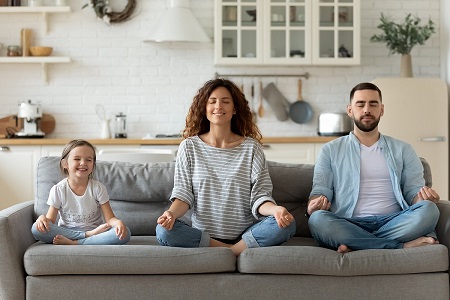Everyone has experienced the feeling of anxiety, be it heart palpitations, tension headaches, upset or butterflies in the stomach, sweaty palms, or tightness in the chest. And anyone who has been in the grip of anxiety knows the intensity of it and would prepare themselves for a ‘fight or flight’ response. One in 14 people around the world are affected with anxiety disorder, hence, if you are dealing with anxiety, you are not alone in this fight. Meditation for anxiety has become a practical tool as more and more people are using it to relieve stress, anxiety and cope with life and foster personal growth.
Managing Anxiety through Meditation
To manage anxiety, we must understand and know the inconsistent nature of our anxiety and how it operates. Anxiety is intellectual state associated to lack of ability to regulate emotions. We can acquire better sense of what triggers anxiety through MEDITATION.
Regular meditation practice can reprogram neural trails in the brain and hence, improve the ability to control emotions. With meditation, we train ourselves with anxiety-inducing feelings and scenarios. In this process we sit with anxiety and later let them go. We know that our thoughts do not define us, and it is not real – we steadily tend to change our relationship with anxiety. While meditating we learn body awareness skills that brings to our attention on any physical sensation felt. To feel this sensation, we sit with our senses and thoughts to stay more tuned to what is being experience. A consistent practice will help your brain better manage anxiety and stress that can cause depression.
Meditation is not a quick solution strategy; it does take an enduring approach. If you are suffering from severe anxiety or an anxiety disorder, contact your health care professional to talk through your preferences and figure out how to make meditation a part of an overall treatment program.
Meditation is one option out of many treatments available to help manage or learn to cope with the feelings of anxiety in a different way, basically changing the connection to anxiety, and the way it is viewed.
How to Meditate?
Meditation is very easy and straightforward; however, it may feel overwhelming or a bit odd if you have never tried it before. To begin with follow these simple steps.
- Be at Ease
Get comfortable and it is better to sit down when you are learning meditation for the first time, but it is okay to stand up if you feel better. The important thing is to feel content and relaxed. Closing your eyes will also deliver comfort.
- Concentrate on your Breath
Take deep and slow breath through your nose and focus on your breathing only for sometime. Just concentrate on:
- The feeling of inhaling your breath
- The feeling of exhaling your breath
- The sound of your breathing
It is normal if your thoughts wander away from your breathing. It is important to redirect your thoughts and focus to breathing whenever you think of something else.
- Change from Breath to Body
Start moving your attention from your breath to the other parts of the body to do body scan. You can start from wherever you like, either with feet, hands, or head. Be conscious on how the body moves from one part to another and continue to breath slowly and deeply.
Start your body scan wherever you like. Some people find it more natural to start with their feet, while others prefer to start with their hands or head. If you feel any unusual disturbing sensation, such as tension or aches – now add a visualization exercise.
- Visualization Exercise
Envisioning yourself conveying relaxing breaths to the parts of body where you feel disturbing sensation. Imagine directing relaxing breaths to the parts of the body where you feel pain and visualize that your pain is easing.
Once you have finished scanning the body, shift your focus to your breathing for as long as you like.
Meditation Tips for Beginners
To help you get started, you can apply the helpful tips learnt from this article together with a guided meditation app like Headspace.
3 Ways to Practice Meditation for Anxiety
- An Easy Meditation to Overcome Anxiety
- Accept your negative emotions to exist and allow yourself to act
This is meant to define the probability of developing a unique relationship to experience, one that is described by accepting an experience and letting it be. By being aware of your feeling, you can choose to how to respond to them. Hence, it takes a true dedication and involves a premeditated attention to opening to the feelings.
- Disallowing your negative mindset is quite risky
Not experiencing your negative thoughts, feelings or consciousness is usually linked to an emotional chain that can automatically change the habitual and critical modes of mind. Try shifting your opinion for example, ‘I should be strong’ to ‘Oh, the fear is here’, this will allow the chain of habitual responses to be altered.
- Acceptance helps you work through your nasty experience
Psychologically we know that it is helpful to be extra loving, caring, and accepting about ourselves and our feeling, but we do not know how to do it. It requires working through the body with frequent practice over time to see how things like anxiety will show up. Get attention/awareness to the feelings that accompanies challenging experiences that offers the possibility to learn to relate differently to such experiences. Working through the body allows people to understand their own rational practice and be okay with their nasty experience
- Meditation for Anxiety and Stress
Give yourself thirty minutes to meditate in a comfortable and in an alert position.
- Take a moment to thank yourself for taking time out for yourself and doing something for yourself.
- Connect your mind and body. Feel for any sensations, holdings or tightness in your body and feel for your mood, emotions or feeling and accept whatever is felt.
- Slowly move your consciousness from the mindful checks to your breath. Be aware of your breath in the abdomen, inhaling and exhaling with awareness.
- Shift your awareness from your breath to your body scan. Acknowledge all your emotions, feelings, and sensations being experienced and let it be.
- Breath into your whole body. At times you will feel tensions, tightness or heaviness and allow to soften it if you can and let it be if you cannot.
- Be kind to your anxious thoughts. If it seems that even after doing the body scan and mindful breathing, we are continuing to have the anxious feelings, give attention to those feelings and know what is being felt.
- Walk into your feelings with kindness and calmness. Very gently feel the feeling of fear with awareness, no need to analyse your fear. Just feel the feeling of anxiousness, fearful, worrying and let it be – feel into the heart of fear. Acknowledge your feeling and work through with feeling of anxiety. As we learn or feelings of fear, we may discover the fundamental cause of our fear and pain.
- Now come back to your breath. Breathing in and breathing out, with alertness. Staying present to each breath, in and out. Take a moment to thank yourself for positively turning your fear and working with them.
- Guided Meditation for Anxious Feelings
It is a challenging practice as it involves deliberately investigating the experience of anxiety. Listen to your inner voice to determine whether it feels right to do it at that time. Do your first practice when you feel safe and curious and have energy and time to explore your anxiety more deeply.
The Benefits of Meditating
People are now more attracted to practice meditation as they discover its increasing benefits. It is a very beneficial way to reduce stress, improve concentration and helps the whole body with a range of different conditions.
Meditation assists in reducing high blood pressure, calms the mind, positive mood and outlook, healthy sleeping patterns and increases pain tolerance. The habitual process of meditation trains your mind to focus and redirect your thoughts and increase awareness of yourself and your surroundings.
Physical Benefits of Meditation
- Feeling less anxious, the panic attacks, tensed muscles and other symptoms of anxiety are not felt often or not at all felt.
- Reduces your blood pressure, you will feel calmer and less likely to indulge on wrong foods which will decrease the level of unhealthy cholesterol in your bloodstream – reduces the chance of having stroke or heart attack.
- Getting better sleep – easily falling to sleep and staying asleep for longer period. Feeling better rested when you wake up.
- Improves your athletic performance – staying more focus to your goals and track with working toward your goal.
- Meditation can put an end to your addiction to drugs and alcohol.
- As you age, your mind will be sharper, and you will feel stronger.
Mental benefits of Meditation
It has been proven that regular meditation helps you deal with emotional issues.
It can:
- Helps in dealing with anxiety and other severe conditions like Post-traumatic stress disorder (PTSD).
- Helps in focusing on the present – can move on easily from past upset situations or stop worrying about what is yet to happen.
- Makes it at ease to deal with stressful situations
- Enables you to maintain your ongoing focus – able to focus on the current issues without being distracted.
- Enhances the symptoms of depression – it has been proven as useful as medications and without any severe side effects.
- Improves your mental intelligence – you will know what you are feeling and better able to divert your negative emotions and be more considerate to those around you.
- Helps you walk through your fears and phobias.
Everybody has different reasons for meditating, whether it be to reduce job stress, any kind of anxiety, minimize physical pain, improve relationship or to define life’s direction. Through meditation, we can understand the nature of anxiety and what it does to the mind and comprehend what causes it and then find ways to avoid falling into that trap again. All in all, meditation provides immediate relief and we can get to the core of anxious feeling and make great changes.

